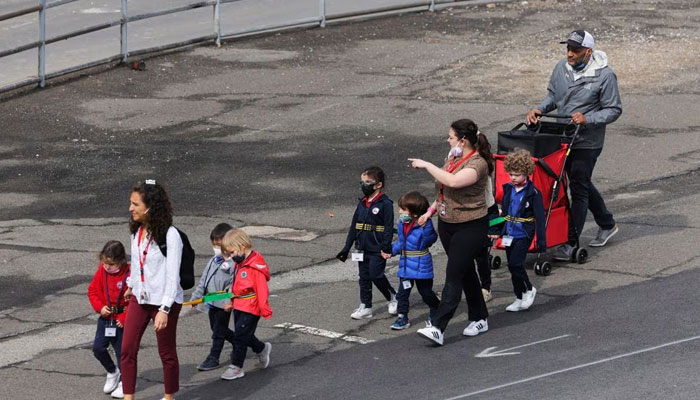Effects of climate change on children may be worse. Here is how
Global temperature is already up 1.1 degrees from pre-industrial levels despite pledges to limit it to 1.5 degrees
April 27, 2023

Climate change impacts everything that surrounds human beings. It has adverse impacts on the weather, the environment, the air we breathe and the food we consume.
Children are also vulnerable to the deteriorated quality of the atmosphere, infectious diseases, excessively warm weather and longer allergy seasons, because of their developing stage.
A new report by the Environmental Protection Agency (EPA) said that kids whose families are low-income or who don't speak much English will be hit the hardest if temperatures rise, reported CBS News.
Researchers have studied the effects if the world were to breach the global 2-degree Celsius temperature and reach 4 degrees.
The global temperature is already up 1.1 degrees from pre-industrial levels despite pledges to limit it to 1.5 degrees.
The report suggested parents and guardians enlighten their children on health threats related to climate. It also said that the children should be told to speak up if they are not well.
Here are the impacts on children due to climate change.
Poor air quality
According to the report, children have relatively small airways and developing immune systems, which makes them prone to getting respiratory diseases and suffering from allergies.
As wildfires are becoming widespread due to rising temperatures, children will be affected badly due to smoke and air pollution.
Additionally, carbon dioxide (CO2) causes plants to release more pollen — making allergies worse.
The report stated: "Climate change could increase oak, birch, and grass pollen so severely that pediatric asthma-related emergency room visits could increase 17%-30% annually. Similarly, new cases of pediatric asthma would increase between 4% and 11%."
Infectious diseases
Favourable conditions for insects carrying infectious diseases such as mosquitoes are warm and humid weather.
The report noted that with temperature on the rise, pediatric cases of diseases like Lyme disease and West Nile virus will also witness a surge. The report estimates Lyme disease in children is projected to increase by 79% to 241% annually.
Coastal flooding
A number of one to two million children are expected to lose their homes — temporarily or permanently — due to flooding.
And if children face homelessness, it will have adverse impacts on their development and can lead to "significantly higher rates of emotional, behavioural, and immediate and long-term health problems," said the Department of Health and Human Services.
Heat and learning
Learning and temperatures are correlated. It impacts how children learn.
The report revealed that high temperatures could cause students to perform worse by up to 4% to 7% academically, which directly impacted future income, translating to billions in lost income annually across graduating classes and the loss of thousands of dollars for individual students.
The effects described can cause long-term trauma to students which may stick with them for their lifetime.
While in a statement to CBS News, Dr Aaron Bernstein, a paediatrician at Boston Children's Hospital, said: Until the root cause of climate change is stopped — burning fossil fuels — children will continue to be at high risk of things like severe asthma and allergies.
Parents can try to keep their kid's allergies at bay by frequently cleaning their clothing, hands and face. This helps clean off pollen and should especially be done before bedtime, Brenstien said who is also an interim director of the Center for Climate, Health, and the Global Environment at Harvard TH Chan School of Public Health.











